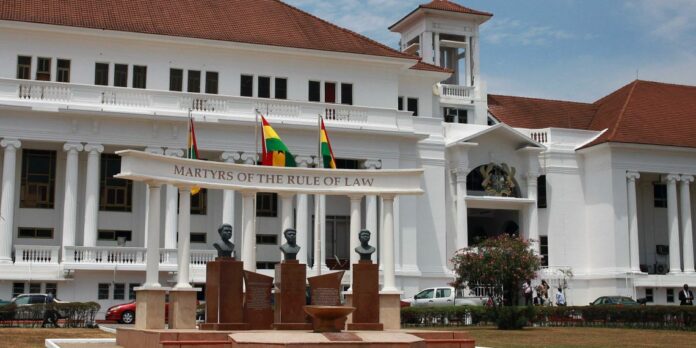A Professor at the University of Ghana, Ransford Gyampo has urged the Supreme Court not to demonstrate double standards.
Prof Gyampo compared the apex court’s position on issues involving Santrokofi, Akpafu, Likpe, and Lolobi (SALL) with that of the controversy surrounding the declaration of four seats vacant by the Speaker of Parliament, Alban Bagbin.
For him, the Supreme Court’s argument for refusing the application of the Speaker of Parliament in the vacant seat case, that people in the four constituencies declared vacant would be denied presentations, smacks of double standards because SALL has been denied representations for four years.
The people of Santrokofi, Akpafu, Likpe, and Lolobi were unable to cast their ballot in the parliamentary election in 2020.
Speaking on the Key Points on TV3 on Saturday, November 2, he said “well meaning Ghanaians should be worried about this because it shows a certain double standard that festers a certain derogatory perception that people have about the court as shown by the Afrobarometer surveys conducted.
“In my view, they shouldn’t show that double standards. Supreme Court, are you aware that the people of SALL have been denied representations for four years? I expect the Supreme Court to be concerned about how people perceive it.”
The Speaker, Alban Bagbin was seeking to nullify the Supreme Court’s decision to stay his ruling on the four seats.
The Speaker also sought to set aside a writ filed by Majority Leader Alexander Afenyo-Markin, which had requested judicial intervention to prevent the Speaker from issuing further declarations on the disputed seats.
His lawyer Thaddeus Sory, Bagbin argued that the court had overreached by suspending his ruling, which he insisted was a parliamentary decision outside the judicial remit. His motion asserted that, as the Speaker’s actions were non-judicial, they should not be subject to stays of execution, a mechanism typically applied to court rulings.
“In terms of orders staying execution of rulings, the Supreme Court’s powers, under the 1992 Constitution of the Republic of Ghana and statute, to stay execution of rulings are limited to rulings of itself and of courts lower in the judicial hierarchy but do not extend to a ruling of the Speaker of Parliament who is not part of the judicial hierarchy.”
But in her ruling, the Chief Justice explained, “Given the irreparable harm that could be caused to the constituencies—comprising hundreds of thousands of Ghanaians—who would be left without MPs and without the possibility of by-elections, as well as the irreversible impact on MPs potentially losing their seats just weeks before the December 7 election, it is necessary for this court to address this dispute promptly rather than issuing a 10-day interim order on Article 97(1)(g) as interpreted by the Speaker.
She added that it is vital for the Supreme Court to expedite proceedings, bridging the standard 14-day period, by allowing the constitutional action to proceed through a statement of case, requiring parties to submit their claims within seven days, and moving quickly to resolve the issues presented.
According to the Chief Justice had all parties complied with these directives within the suggested timeline, the case could have been resolved within the 10 days the applicant requested.











